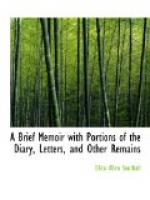The family-circle, until broken a few years before her own marriage by that of an elder sister, consisted, in addition to her parents, of five daughters, two of whom were older and two younger than Eliza. Her father was long known and deservedly esteemed by Friends in England, and her mother is an approved minister. John Allen was a man of sound judgment and of liberal and enlightened views, ever desirous of upholding the truth, but at the same time ready to listen to the arguments of those who might differ from him in opinion. Moderate and cautious in counsel and conduct, firm, yet a peacemaker, he was truly a father in the Church. For many years he took an active part in the deliberations of the Yearly Meeting, and was often employed in services connected with the Society. He was known to many Friends on the American continent, from having visited that country in 1845 by appointment of the London Yearly Meeting. He was the author of a work entitled “State Churches and the Kingdom of Christ,” and of several pamphlets on religious subjects. He died in 1859.
John Allen retired from business at an early age; and a prominent reason for his doing so was that he might devote himself more fully to the education of his daughters, which was conducted almost entirely at home. Having a decided taste for the ancient classics, he considered that so good a foundation of a sound education ought not to be neglected. The same might be said of the older history and literature of his own country, including its poetry, in which he was well read; but he fully encouraged his pupils to become acquainted also with the better productions of the day, to the tone of which their younger minds were more easily adapted. Nor was education confined to direct instruction in the school-room. In a little memoir of John Allen, published in the “Annual Monitor,” we read, “In the domestic circle, the tender, watchful care and sympathy of the parent were blended with the constant stimulus to self-improvement of the teacher; and the readiness to sacrifice personal ease and convenience, in order that he might enter into the pursuits and amusements of his children, was united with an unremitting endeavor to maintain a high standard of moral and religious feeling. Thus by example as well as by precept did he evince his deep concern for their best welfare. As years passed on, his cordial sympathy with their interests, and his anxiety as far as possible to share his own with them, gave an additional power to his influence, not easily estimated.” Such were the simple and natural means of education employed. The aim was true enlargement of mind; and the desire was carefully instilled that the knowledge acquired should be valued for its own sake, not as a possession to be used for display. At the same time, care was taken not to destroy the balance between the intellect and the affections, so that, whilst the growth of the mental powers was encouraged, domestic and social




